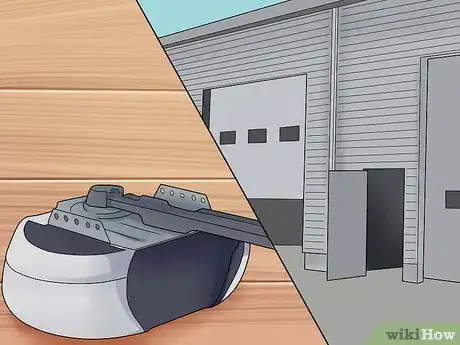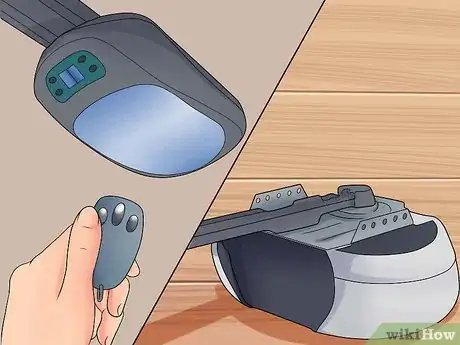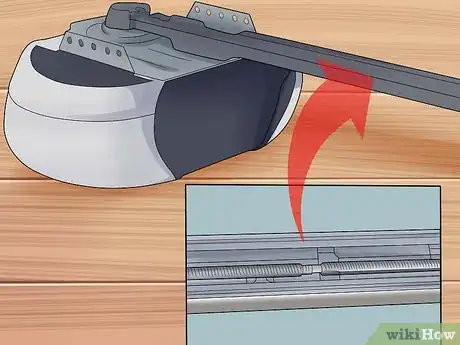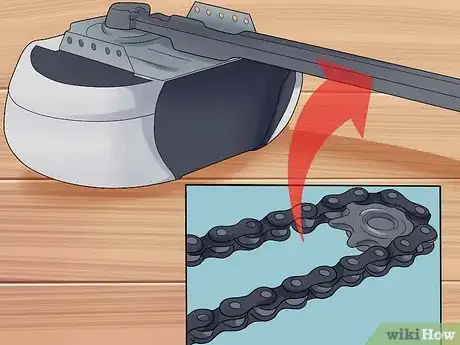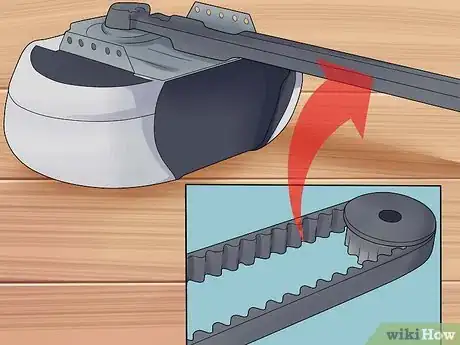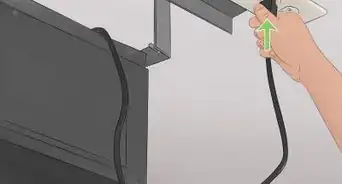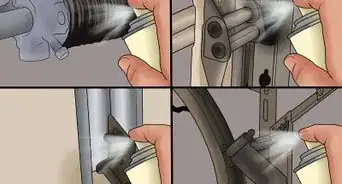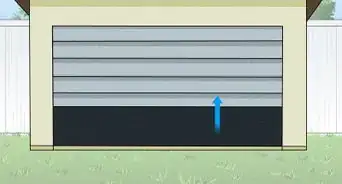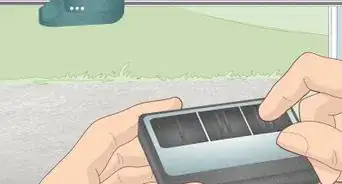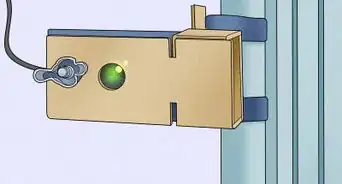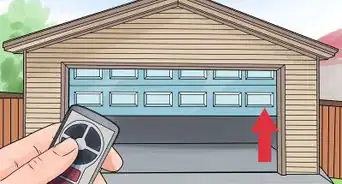wikiHow is a “wiki,” similar to Wikipedia, which means that many of our articles are co-written by multiple authors. To create this article, 20 people, some anonymous, worked to edit and improve it over time.
wikiHow marks an article as reader-approved once it receives enough positive feedback. In this case, 86% of readers who voted found the article helpful, earning it our reader-approved status.
This article has been viewed 112,549 times.
Learn more...
With so many different types of garage door openers on the market, you may not be sure where to start. The main consideration for a garage door opener is the drive type, which refers to the actual chain, belt, or other mechanism that moves and lifts the door. In some circumstances, the horsepower output of the motor should be considered as well, but typically in commercial or industrial settings. Whether for a home garage or something heftier, you can easily determine the type of opener best suited to your needs.
Steps
Considering the Drive Options
-
1Consider chain-drive openers as a cost-effective option. Chain drives are some of the most popular and durable openers on the market. These drives use a metal chain on a sprocket to lift and lower doors.[1] Chain openers also tend to be some of the most affordable options; however, the affordability and strength of a chain drive come at the expense of noise.[2]
- Chain drives are ideal for the heaviest garage door types, including oversized doors, one-piece wood doors, and wind-rated or heavily insulated doors.
- If you have a detached garage or a garage that is at the opposite end of the house from the bedrooms, then the noise will be less of an issue.[3]
- Many upgraded chain-drive models can come with chain separators to help stop the chain from hitting against the track, which cuts down on the noise of a chain drive.[4]
-
2Consider screw-drive openers for a well-rounded option. Screw drives use a long metal rod threaded like a screw to lift and close garage doors.[5] Due to having relatively few moving parts, a screw drive tends to be quite reliable as well.[6]
- If noise is your biggest consideration, screw-drive openers tend to be middle of the pack. They’re not nearly as quiet as belt or direct drives, but they are most typically quieter than chain drives.[7]
- Screw drives also require a bit more maintenance than most of the other types. Despite having fewer moving parts, the threaded metal rod meshes against a drive section with plastic teeth to catch the threading. Without the proper lubrication on this drive, the rod can wear on the teeth and eventually strip them, so you must grease the works fairly regularly—approximately every few months.[8]
- The type of garage door you have should also be taken into consideration. For heavy wood one-piece doors, the extra weight and strain can wear the teeth in the inner works of the drive down pretty quickly. This makes screw drives most effective with single-car garage doors or steel doors since the thinner materials cut down on weight.[9]
- Screw-drive openers also offer some of the faster speeds available. Newer models can open at 10” to 12” per second as opposed to the more standard 6” to 8” per second of most other drive types.[10]
Advertisement -
3Consider belt-drive openers for quiet operation. Belt-drive openers use a rubber or rubber-like belt on a cog to open and close doors.[11] Since the opener doesn’t have the loud, banging metal parts, it’s one of the quietest options available.[12]
- Consider your particular garage door. If your door makes a lot of noise on its track, then the lower volume of the belt opener may be moot.[13]
- Pay special attention to the current of belt-drive openers. Alternating current belt openers start and stop at full power, which can cause the door to jerk into movement and lead to noise despite the relative quiet of the drive.[14]
- Direct current belt drives offer soft starts and stops that reduce noise even further, as well as reducing wear and tear.[15] [16]
-
4Consider direct-drive and jackshaft openers for quiet and highly dependable options. Though less common than the other models, these alternatives are gaining in popularity, and both offer additional options for quiet door openers.
- Jackshaft openers attach directly to the front wall of the garage, meaning no overhead parts.[17] These models use cables attached directly to the garage door along with pulleys and a rolling torsion bar to lift and lower the door.[18] Many models of this computerized system even include an automatic deadbolt that locks when the door closes for added safety.[19] Due to the compact nature and computerization, jackshaft openers are some of the most expensive models available, and the cable system also means that they only work on sectioned garage doors.[20] [21]
- Direct-drive openers still have an overhead rail with a chain, but the actual motor moves along the track with the door connected to the motor via a J-arm.[22] Since the motor moves instead of the chain, these models are also extremely quiet, and since the only real moving part is the motor, they tend to come with extremely good—maybe even lifetime—warranties. They are still on the pricey side, however—comparable to a belt drive opener.[23]
Considering the Horsepower Options
-
1Consider 1/2-HP models for standard doors. 1/2-HP is the standard for most garage doors, and it is also the most popular motor speed. Depending on the type of drive you pair it with, the 1/2-HP motor can lift most garage door types. However, while it can lift most door types, well-insulated garage doors and one-piece, wooden doors can put extra strain on 1/2-HP motors that might lead to more wear and tear than with something more powerful.
-
2Consider 3/4-HP models for insulated or one-piece, wooden doors. 3/4-HP motors are the next step up from 1/2-HP models. The additional power makes these motors a more durable, longer-lasting option, but the increased durability comes with a higher price tag as well. The extra power doesn’t just increase the life of these motors, but it also means they’re capable of lifting heavier doors more easily without as much wear.
- Door styles that might benefit from the additional power include one-piece wooden doors on two-car garages or specialty doors with heavy insulation and wind-load ratings.
-
3Consider 1-HP models for oversized or industrial doors. 1-HP motors offer the maximum in efficiency and power. These motors are perfect for the heaviest garage doors, including oversized doors and commercial or industrial doors. When it comes to a standard, sectioned garage door, the extra power may prove unnecessary for your needs, especially at the larger price.
-
4Consider AC versus DC motors. In addition to the horsepower of a motor, you should also consider the current. Direct current motors are most common on belt drives, but more manufacturers are incorporating them into other drive types as well. Direct current motors are typically more expensive, but they offer the added benefit of soft starts and stops, which means that the drive begins a gradual lift and stop on the door, and this equates to much less noise than a motor that jerks to life and shakes the door.[24]
- Direct current motors are also more likely to provide backup battery options, allowing you to get several uses out of your garage door even during a power outage.[25]
Community Q&A
-
QuestionWhat's the difference between residential and commercial openers?
 Community AnswerResidential openers are for homes and commercial openers are for more heavy-duty doors.
Community AnswerResidential openers are for homes and commercial openers are for more heavy-duty doors. -
QuestionCan someone else open my garage door by picking up my code?
 Community AnswerYes, but most have a maximum of four attempts before locking out.
Community AnswerYes, but most have a maximum of four attempts before locking out. -
QuestionHow do I verify the length of the belt drive on a Liftmaster garage door opener?
 Community AnswerLiftmaster door openers are only available through professional installers. You would ask them to verify the specs (such as rail size, belt size, stuff like that). Call someone in your area to ask what they have in store for you.
Community AnswerLiftmaster door openers are only available through professional installers. You would ask them to verify the specs (such as rail size, belt size, stuff like that). Call someone in your area to ask what they have in store for you.
References
- ↑ https://www.youtube.com/watch?v=Zw_nb4N2Lzs
- ↑ http://www.thehousedesigners.com/articles/right-garage-door-opener.asp
- ↑ https://www.youtube.com/watch?v=Zw_nb4N2Lzs
- ↑ https://www.youtube.com/watch?v=Zw_nb4N2Lzs
- ↑ http://www.thehousedesigners.com/articles/right-garage-door-opener.asp
- ↑ http://www.thehousedesigners.com/articles/right-garage-door-opener.asp
- ↑ http://www.thehousedesigners.com/articles/right-garage-door-opener.asp
- ↑ https://www.youtube.com/watch?v=Zw_nb4N2Lzs
- ↑ https://www.youtube.com/watch?v=Zw_nb4N2Lzs
- ↑ http://www.bobvila.com/articles/garage-door-openers-101/#.VMSn-3DF8Yc
- ↑ https://www.youtube.com/watch?v=Zw_nb4N2Lzs
- ↑ http://www.thehousedesigners.com/articles/right-garage-door-opener.asp
- ↑ https://www.youtube.com/watch?v=j6eRfRoqRk0
- ↑ https://www.youtube.com/watch?v=Zw_nb4N2Lzs
- ↑ http://www.lowes.com/cd_Garage+Door+Opener+Buying+Guide_1284575875_
- ↑ https://www.youtube.com/watch?v=Zw_nb4N2Lzs
- ↑ http://www.lowes.com/cd_Garage+Door+Opener+Buying+Guide_1284575875_
- ↑ http://www.bobvila.com/articles/garage-door-openers-101/#.VMSn-3DF8Yc
- ↑ https://www.youtube.com/watch?v=Zw_nb4N2Lzs
- ↑ http://www.bobvila.com/articles/garage-door-openers-101/#.VMSn-3DF8Yc
- ↑ https://www.youtube.com/watch?v=Zw_nb4N2Lzs
- ↑ http://www.bobvila.com/articles/garage-door-openers-101/#.VMSn-3DF8Yc
- ↑ http://www.bobvila.com/articles/garage-door-openers-101/#.VMSn-3DF8Yc
- ↑ http://www.bobvila.com/articles/garage-door-openers-101/#.VMSn-3DF8Yc
- ↑ https://www.youtube.com/watch?v=Zw_nb4N2Lzs
- ↑ http://www.bobvila.com/articles/garage-door-openers-101/#.VMSn-3DF8Yc
About This Article
To choose a garage door opener, consider going with a chain-drive opener for the most cost effective solution. Screw-drive openers are known to be user-friendly and reliable, and belt-drive openers are great when volume is an issue, since they're very quiet. For horsepower, 1/2-HP models are the standard choice. If you have oversized or industrial doors, you may want to consider something stronger, like 1-HP models. To learn about other horsepower options, read on!


